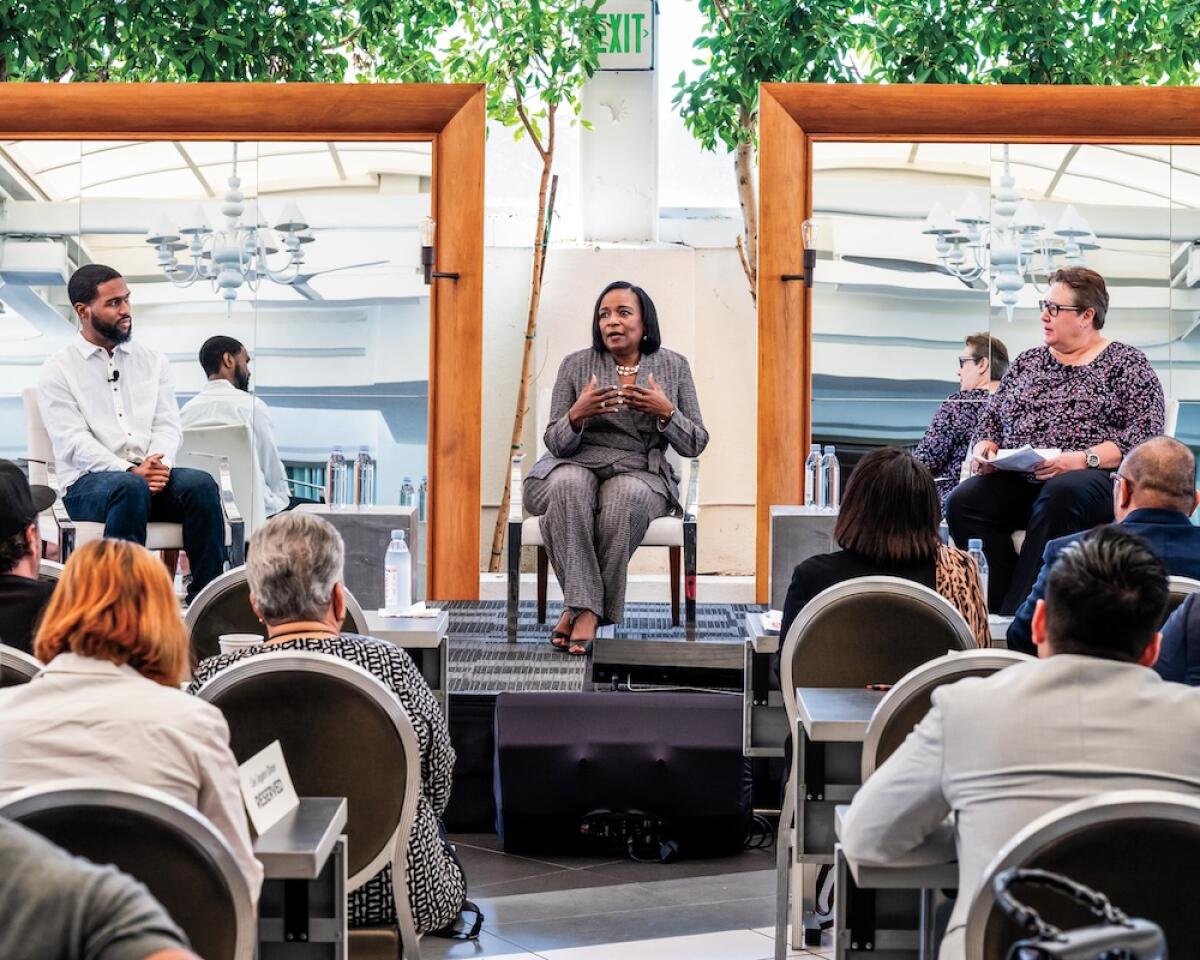Harnessing the Power of Diversity

With so much discussion about what diversity, equity, inclusion and accessibility is, sometimes lost is its practical application in the workplace. What are the true advantages of DEIA when companies choose to implement strong DEIA initiatives? What are the tangible (and intangible) benefits? And most importantly, what benefits will companies have now and in the future by forging ahead with these important measures?
Moderator: Dr. Shawn Andrews
Founder & CEO, Andrews Research International
Dr. Shawn Andrews is a renowned keynote speaker, organizational consultant, and bestselling author. Her two-plus decades of corporate experience includes prestigious organizations like the United Nations, Johnson & Johnson and GSK. As a professor at UC Irvine and Pepperdine, she imparts wisdom on women and leadership, organizational behavior, diversity, and leadership ethics. Her expertise encompasses organizational leadership, talent management, D&I, and unconscious bias. Dr. Andrews holds an Ed.D. in organizational leadership, an MBA from Pepperdine and a B.A. in psychology from UC Irvine.
Panelist: Perika Sampson
Global DEI Strategist, Sampson Dearborn Consulting
Perika Sampson is a highly regarded thought leader, DEI advocate, and strategist. Her most recent corporate experience includes Global Head of Inclusion and Diversity at Gilead Sciences, where she was charged with leading a team of subject matter experts who provide advice, counsel, and leadership on inclusion and diversity strategies, programs, training, and practices. Prior to joining Gilead, Perika was the Senior Regional Diversity Officer for Morgan Stanley Wealth Management. She is an alumnus of the University of California, Los Angeles, a member of the American Heart Association and the Oakland Interfaith Gospel Chorus board of directors. In addition, she is currently chair of the Black Wealth Summit Advisory Board. Sampson resides in Los Angeles, California.
Panelist: Sterling De Sutter Summerville, M.Ed.
DEI Lead, Snap Inc.
DEI expert Sterling De Sutter Summerville uses his interpersonal skill and empathy to aid Snap Inc. (the parent company of Snapchat) in creating equal opportunities and cross-cultural respect. A Fullbright Scholar, world traveler and former Division 1 football star, Summerville empowers others to reach their true potential and affect change. A skilled writer and orator, Summerville has spent much of his young life exploring other cultures and ways of thinking while having important conversations with a wide range of people. Prior to Snap Inc., Summerville held positions at Google and the Fullbright Fund.
Shared insights from the event:
On ensuring that DEI initiatives create meaningful changes:
Sterling De Sutter Summerville: I think organizations can make DEI a reality and make it real to its consequences by baking strategy into their process. We need to treat DEI as if it is just as important as design, just as important as operations. You want to be able to take DEI and put it into every different facet of the work. DEI is critically important to the way that we should build everything. DEI can become more than just a talking point when you bake it into a part of the strategy that touches your consumers.
Perika Sampson: One of the things I say often is “diversity is a management challenge.” Bringing the right people in, ensuring that you’re creating diversity, including it in the total process, and preaching that it is everyone’s opportunity - every single person who carries a business card in your organization has that opportunity to ensure that diversity continues to persist.
On the true definition of of DEI:
Summerville: Diversity is who you have in the room; inclusion is how people are situated with power. I feel like that’s one of the main subjects that is far too often under-talked about. Then, equity is ensuring that people have what they need to succeed.
On the challenges surrounding DEI:
Sampson: One challenge is making sure that everyone understands why this matters, why it’s important to the work that they do, how diversity and ultimately inclusion, connectedly, can improve conversation and contribution. If I’m sitting at a table and I’m contributing fully, and I feel every day when I walk the halls of an organization that I belong here - I’m going to contribute at a high level and in a way that’s authentic, based on where I am and what my experience is. If that doesn’t exist, you could lose an important opportunity. The person who walks out the door because they don’t feel like they belong there could be the person who could have created a solution - you let that brain trust walk out because they didn’t feel safe making mistakes or they didn’t feel safe taking risks.
Summerville: making people understand that DEIA isn’t just “extra.” It’s not something that we should do - it’s something that we have to do. It’s a similar concept to saying: How much sooner would we have gotten here if we had treated people from different gender identity groups with the same opportunities that we gave to others. How much sooner would we have solved some of our complex problems had we given more people the opportunity to participate? On making DEIA work and grow over time
Sampson: Your DEIA strategy is a living thing. I tend to like three-to-five-year goals versus five years on, because it’s living - life changes every day. We just had some legal rulings that are now impacting the way we approach DEI. There are things going on in the world, transitions in the world, especially since we’re looking at global impact, that we have shaping DEI. Just remember that it’s a strategy that’s a living thing. We should revise regularly to ensure that we’re contributing things that matter to our employees and to our businesses.